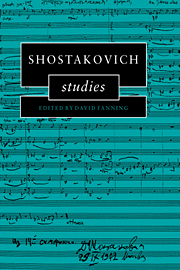Book contents
- Frontmatter
- Contents
- Acknowledgments
- 1 Introduction. Talking about eggs: musicology and Shostakovich
- 2 Public lies and unspeakable truth interpreting Shostakovich's Fifth Symphony
- 3 Form in Shostakovich's instrumental works
- 4 Russian theorists on modality in Shostakovich's music
- 5 The cycle of structure and the cycle of meaning: the Piano Trio in E minor, Op. 67
- 6 Leitmotif in Lady Macbeth
- 7 From Lady Macbeth to Katerina Shostakovich's versions and revisions
- 8 The Golden Age: the true story of the première
- 9 ‘And art made tongue-tied by authority’ Shostakovich's song-cycles
- 10 A debt repaid? Some observations on Shostakovich and his late-period recognition of Britten
- 11 Shostakovich and Schnittke: the erosion of symphonic syntax
- Index
7 - From Lady Macbeth to Katerina Shostakovich's versions and revisions
Published online by Cambridge University Press: 22 October 2009
- Frontmatter
- Contents
- Acknowledgments
- 1 Introduction. Talking about eggs: musicology and Shostakovich
- 2 Public lies and unspeakable truth interpreting Shostakovich's Fifth Symphony
- 3 Form in Shostakovich's instrumental works
- 4 Russian theorists on modality in Shostakovich's music
- 5 The cycle of structure and the cycle of meaning: the Piano Trio in E minor, Op. 67
- 6 Leitmotif in Lady Macbeth
- 7 From Lady Macbeth to Katerina Shostakovich's versions and revisions
- 8 The Golden Age: the true story of the première
- 9 ‘And art made tongue-tied by authority’ Shostakovich's song-cycles
- 10 A debt repaid? Some observations on Shostakovich and his late-period recognition of Britten
- 11 Shostakovich and Schnittke: the erosion of symphonic syntax
- Index
Summary
It is well known that Shostakovich's Lady Macbeth exists in two different versions. The first, designated Op. 29 in the composer's catalogue, was completed late in 1932 and staged almost simultaneously in Leningrad and Moscow, both rival productions having their premiéres in January 1934. Despite the initial popular success of these productions, the opera effectively disappeared from view soon after it and its composer came under official attack in 1936. Almost thirty years later, when it was finally revived in Moscow in January 1963, the libretto had been thoroughly reworked, the music somewhat less so. To underscore the differences, the composer gave this new version the opera's alternative title, Katerina Izmaylova, and assigned it a new opus number, Op. 114. It was in this revised form that the work quickly regained its place in the repertory both at home and abroad.
It is often assumed that Shostakovich's new version resulted solely as a response to the public censure of the opera in 1936. Previous comparisons of the two versions of Lady Macbeth have frequently been used to demonstrate how effectively the Soviet regime's aesthetic criteria were applied: the opera ‘before’ and ‘after’ socialist realism; the opera as a showcase for the benefits (or abuses) of political intervention; and so forth.
In fact, interest in the alternative versions all but evaporated after 1979, when the 1932 score of Lady Macbeth surfaced again in the West, inaugurating a spate of new productions based on this rediscovered ‘original’ version.
- Type
- Chapter
- Information
- Shostakovich Studies , pp. 160 - 188Publisher: Cambridge University PressPrint publication year: 1995
- 2
- Cited by

